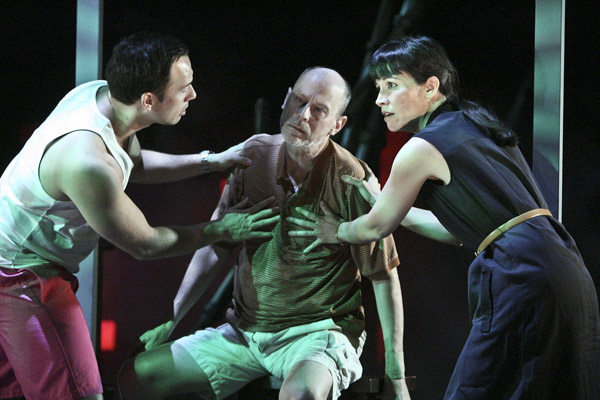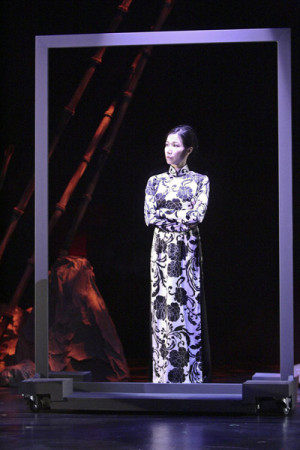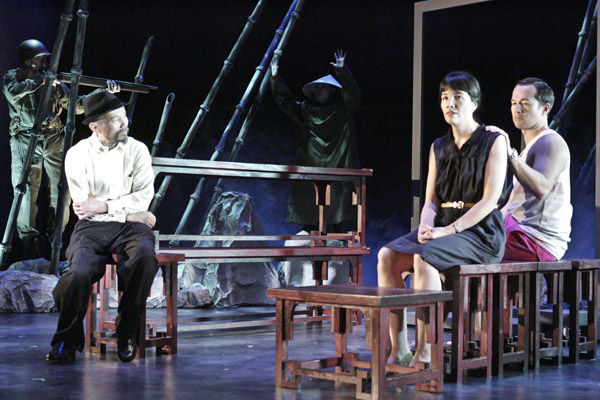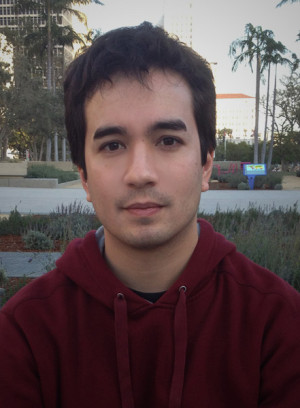This was originally published at LA Stage Times and has been republished at 8Asians with the author’s permission. Christmas in Hanoi is currently running at East West Players at David Henry Hwang Theater, 120 Judge John Aiso St., Los Angeles. Wed-Sat 8 pm, Sun 2 pm. Ends March 10. $26-$36. 213-625-7000.
By Eddie Borey
My parents never talked about the War.
My mother was born in Vietnam. My father, Irish-Catholic from upstate New York, met my mother in Saigon. It was an office romance. He fell in love with my mother, and the country. They wanted to build a life together over there, since they both thought, optimistically, that South Vietnam was going to last. That hope ended in 1975, although I didn’t learn until I was a teenager how close they cut their escape: three days before the fall of Saigon.
Sometimes, my mother talked a little about Vietnam — funny stories about her father’s alcoholic pet monkey, or a mishap involving baby ducks. To hear her tell it, Vietnam was like Mayberry — only bigger, quirkier, and tropical.
Incredible as it seems, I didn’t know that there had been a war in Vietnam until age 6 or 7, when I learned it from TV.
Every April, my parents’ moods would darken. Only when I was in my 20s did I realize that it was because April was when Saigon fell.
The silence is a wall. It is insurmountable. It doesn’t even get as far as “I don’t want to talk about it.” To say that much means admitting there’s something to talk about.
Other Vietnamese Americans say the same thing — their parents didn’t talk about it. Is it the scale? The American experience of the war is just a piece of it. In the entire civil war, millions of Vietnamese died. The US dropped more bombs on Vietnam than on all the nations of the world combined in World War II, destroying life, the environment, art and architecture. That pain is felt as absence — in ancient places that became ruins, in ruins that became dust. Vietnam feels its heritage as a phantom limb.
Or does the silence come from the immigrant mentality? By definition, an immigrant moves on. Maybe the less you carry, the better. But if our parents’ gift to us was forgetting, why do so many Vietnamese-Americans of my generation feel haunted by the War?
I wrote Christmas in Hanoi from a place of rage. I knew that rage would be hard to explain. American audiences who aren’t Vietnamese know nothing about Vietnam, but they have specific expectations of a Vietnam story. They want to be either flagellated or forgiven, in a story about Americans doing ill or good. But this isn’t about them. It’s about the war-generation Vietnamese and their families, and the way the past haunts the living, even generations later. Even today, Americans think of the Vietnam War as an American tragedy — a solipsistic designation, to say the least. I wanted to re-orient those assumptions.
 A tonic bubbles up into the play. Vietnamese religion, eclectic, full of paradox, is something you do more than something you believe. Belief or non-belief is the central fact of Western religions; metaphysical beliefs in Vietnam are less important than metaphorical ones, and still less important than the rituals, the religious actions that structure life and death.
A tonic bubbles up into the play. Vietnamese religion, eclectic, full of paradox, is something you do more than something you believe. Belief or non-belief is the central fact of Western religions; metaphysical beliefs in Vietnam are less important than metaphorical ones, and still less important than the rituals, the religious actions that structure life and death.
The stage is a good place for a religion of metaphor and action.
The War, the past, ritual, loss. I wanted to lob that cocktail at a family. The Ganleys are a sweet, relatively well-adjusted, Irish- and Vietnamese-American family. They are not my family, but they come from the same clay. The children, Winnie and Lou, went to great schools, and now have excellent careers — a testament to the winning strategy of forgetting.
But there are ghosts. Those who reflexively despise anything with a whiff of the supernatural, as Winnie does, are hung up on metaphysics. Tenets of faith are the obsession of Western religion, a fixation that ironically lingers on, reversed, in the anti-religious. On stage, a ghost is a metaphor. In life, not all ghosts rattle chains; some are silent. Some of them take the form of silence.
 Another paradox: Vietnam is not silent. When I went there for the first time, like the Ganleys I was overwhelmed by pandemonium. A different religious worldview, the War, poverty, millennia of history — if you have eyes and ears, you’ll realize you’re crawling on a colossus. But most especially, you’re knocked flat by life continuing, raucously. There’s no way to make sense of it, except to say that Vietnam isn’t just history — it’s a living place with a future.
Another paradox: Vietnam is not silent. When I went there for the first time, like the Ganleys I was overwhelmed by pandemonium. A different religious worldview, the War, poverty, millennia of history — if you have eyes and ears, you’ll realize you’re crawling on a colossus. But most especially, you’re knocked flat by life continuing, raucously. There’s no way to make sense of it, except to say that Vietnam isn’t just history — it’s a living place with a future.
The greatest challenge was to combine the personal with this vast world, to focus on the Ganleys’ story in the context of the larger story. The way to tie them together was the ghost story. Ghost stories reckon with the past; they also are about being stuck. A trauma holds you, like amber, and you are left with only that. Winnie, in her own way, is a ghost. Despite a nature full of love, she has mummified herself without understanding how or why.
Jeff Liu, the director, understood that we didn’t want to solve a mystery. What’s haunting the Ganleys? To name it and exorcise it would be to underestimate the history involved. The rules of the ghost world? Are there rules for how the past shapes us? It’s not a solved mystery that will set the Ganleys free — it’s an act of acceptance and love. It’s the play itself, carried through as a rite. Jeff and the actors made it happen. Thanks to them, with each new draft the characters became clearer, each with a wish that they’ve come to Vietnam to fulfill.
This is an ensemble piece, but all stories fold into Winnie’s story with her mother Oanh. Surrounded by ghosts, Winnie has to learn how to live. I wrote the play to find out if she could do it.
Photo Credits: All Christmas in Hanoi production photos by Michael Lamont.
ABOUT THE AUTHOR: Eddie Borey studied creative writing at Harvard. He now works as a screenwriter with his brother, Chris. This is his first play for the stage.









